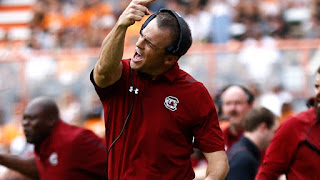Swinney is right, education isn't important in college football anymore
Clemson head football coach Dabo Swinney has made the news after the most recent early signing period, but not for the class of prospects he and his staff signed.
During his signing day press conference, Swinney remarked on the current state of Division I football, the transfer portal and name, image, likeness (NIL) deals.
"It's chaos right now. Tampering galore," he said. "Adults manipulating young men. Education is like the last thing now."
And, he is right.
Division I college football, and the NCAA as a whole, have put a priority on business and making money for its college athletics over education.
So you will be happy to hear that Swinney has bucked the trend of college coaches and had his contract filled with incentives tied to his teams academic performances.
On top of his $8.3 million salary for 2021, which will increase to $10 million per year in 2027 and 2028, he will get addition money for graduation rates, team GPA and retention. And it also puts a priority on the difficulty of the major and the course load taken by each individual player.
What, that isn't his incentive package? What are his incentives?.
LINK: Copy of Dabo Swinney contract
LINK: Swinney signs lucrative deal
According to the contract, incentives are ACC championship appearances and wins, bowl game appearances and wins, college playoff appearance and wins, national title game appearance and wins and conference and NCAA coach of the year awards.
Only two incentives are remotely tied to academics and that is the academic progress rate (APR), which in short just means are your guys flunking out or not.
In short, Swinney is right that the NCAA athletics has put education last, but so does his contract.
Let's get one thing straight, I'm not decrying Swinney or coaches getting paid. Swinney has been a successful coach and he isn't even the highest paid coach at the FBS level.
That honor goes to Lincoln Riley, who recently signed a contract with Southern Cal for over $10 million per year. For context, Swinney is the sixth highest paid.
But for Swinney to make this argument is hypocritical at best, and misguided at worst.
No doubt, NLI and the transfer portal have put college atheltics, namely football, into a new era. But let's not pretend college football was this honorable, clean sport until NLI came into existence.
There are multiple stories of bagmen, benefits and contracts going back decades. Just see Miami in the early 2000s and 1980s, Florida State in the 1990s, or SMU and the "death penalty" it got for all the money it was funnelling to players.
You could argue when Oklahoma's Bud Wilkinson made over $100k per year in 1957 that college ball became a business.
LINK: Coach salaries through history
Or in the 1980s when salaries starting creeping to that million-dollar mark, or in 1996 when Steve Spurrier became the first million-dollar salary while at Florida.
In actuality, the post-WW2 era has seen everything priortize profits and money, and college athletics is just a reflection of that. Although looking at the history, it seems to have increased exponentially in the 1980s.
College athletics is a business, a multi-billion dollar a year business looking at the NCAA revenue, and Swinney and many other coaches have benifitted from that business.
If Swinney was truly serious and wanted to make a point, he would rework his contract to put a priority on academics and less on on-field success.
Of course if he did that and the product on the field reflected that, he likely wouldn't have a job at Clemson very long.
"It is great you graduate your players and they have a 3.8 team GPA and are all in molecular biology, theoretical physics, architecrture and engineering. But you won six games this year, which ain't good enough."
Or, he could donate, let's say, half of his salary to the university. I'm sure there are some teaching positions they could fill, or update some technology or build a compurter lab or two with $4 million.
A third idea, he could drop down to Divison II or III where he might a low six-figure salary and in the case of Divison III, coach players who aren't on scholarship and are in school for academics.
Swinney is right about how college football has become a big business that has turned an ambivilous eye to academics. But I don't see him changing his focus to recruitng guys based on their GPA instead of their 40-yard dash times any time soon.



Comments
Post a Comment